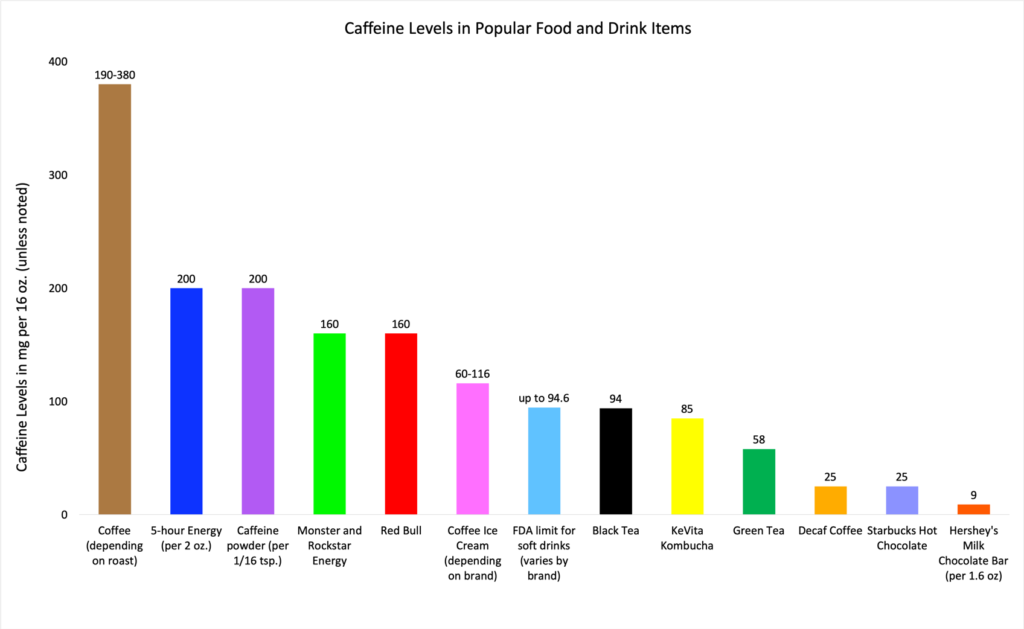
Data courtesy of the Center for Science in the Public Interest
Can you go a day without drinking your morning coffee? Are you drinking too much caffeine? According to Mayo Clinic, you should not consume more than 400mg of caffeine per day. So how much are you actually consuming each day? The Center for Science in the Public Interest’s Caffeine Chart shows that in a 16 oz. coffee, there can be anywhere from 190-380mg of caffeine, depending on the roast with lighter roasts having more caffeine. Caffeine is also present in a variety of energy and soft drinks, tea and chocolate.
If you pay attention to your total caffeine consumption per day, it’s likely that you are drinking a safe amount of coffee and may even be receiving some benefits. According to Healthline, these benefits can include improving energy levels and making you smarter, helping you burn fat, improving physical performance, providing essential nutrients, lowering your risk of Type 2 Diabetes, protecting you from Alzheimer’s disease and dementia, lowering your risk of Parkinson’s disease, protecting your liver, fighting depression and making you happier, lowering the risk of certain types of cancer, lowering the risk of a stroke, and helping you live longer.
Curious about how caffeine works? Here is a look at what happens inside your brain. Caffeine is similar to adenosine, a naturally occuring inhibitory neurotransmitter in our brain. Adenosine naturally causes us to feel tired, but caffeine blocks these receptors, which leaves us feeling alert. If you drink caffeine frequently, the brain adapts to create more adenosine receptors, which is how you increase your tolerance to the caffeine. Caffeine also causes increased levels of dopamine and norepinephrine in the brain when consumed. Because of its effect on the brain, many people can become dependent on caffeine.
Caffeine dependency can be a problem as caffeine intoxication and caffeine withdrawal are both listed in the DSM-5. Caffeine withdrawal often happens when you consume significantly less or no caffeine after frequent prolonged consumption. According to WebMD, symptoms of withdrawal include headache, fatigue, anxiety, irritability, depressed mood and difficulty concentrating. However, most of the symptoms can subside in 7-12 days of reduced consumption, according to Addiction Center.
Caffeine intoxication is a more serious condition and can occur if you consume more than 400mg of caffeine a day, though the exact amount varies by person. Symptoms of caffeine overdose include dizziness, diarrhea, increased thirst, insomnia, headache, fever, irritability, trouble breathing, vomiting, hallucinations, confusion, chest pain, irregular or fast heartbeat, uncontrollable muscle movements, convulsions and even death, according to Healthline.
If you have cardiovascular problems, caffeine is not recommended as it can
increase heart rate. Additionally, it can increase blood pressure and intensify
anxiety disorder symptoms, according to Verywell Mind.
If any of these conditions apply to you, caffeine may have an adverse effect,
even at normal levels of consumption.
Coffee dates and other social activities often include caffeine, which can cause us to easily lose track of daily caffeine consumption. Be mindful and take time to consider the impact caffeine has on health, sleep, mood and anxiety. Taking stock can be one step towards optimizing your overall well-being.
